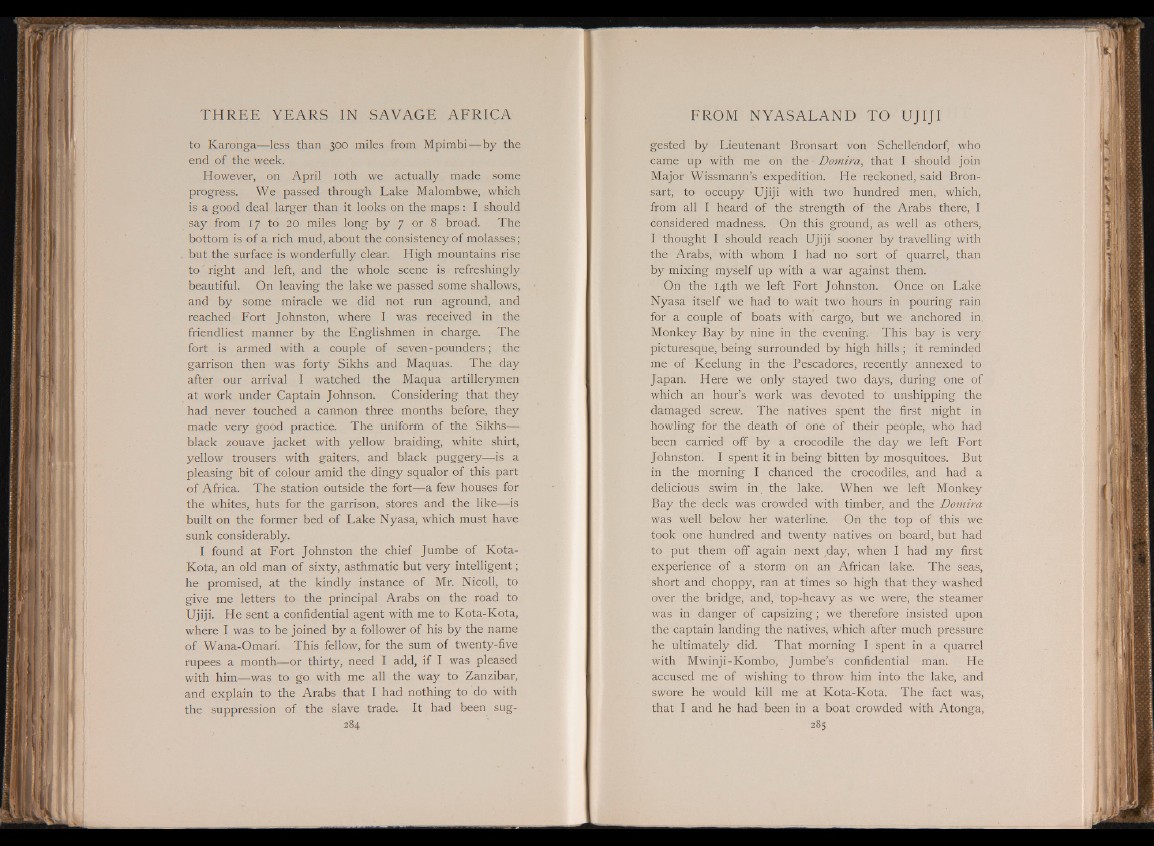
to Karonga—less than 300 miles from Mpimbi—by the
end of the week.
However, on April 10th we actually made some
progress. We passed through Lake Malombwe, which
is a good deal larger than it looks on the maps: I should
say from 17 to 20 miles long by 7 or 8 broad. The
bottom is of a rich mud, about the consistency of molasses;
but the surface is wonderfully clear. High mountains rise
to right and left, and the whole scene is refreshingly
beautiful. On leaving the lake we passed some shallows,
and by some miracle we did not run aground, and
reached Fort Johnston, where I was received in the
friendliest manner by the Englishmen in charge. The
fort is armed with a couple of seven - pounders; the
garrison then was forty Sikhs and Maquas. The day
after our arrival I watched the Maqua artillerymen
at work under Captain Johnson. Considering that they
had never touched a cannon three months before, they
made very good practice. The uniform of the Sikhs—
black zouave jacket with yellow braiding, white shirt,
yellow trousers with gaiters, and black puggery—is a
pleasing bit of colour amid the dingy squalor of this part
of Africa. The station outside the fortS-a few houses for
the whites, huts for the garrison, stores and the like—is
built on the former bed of Lake Nyasa, which must have
sunk considerably.
I found at Fort Johnston the chief Jumbe of Kota-
Kota, an old man of sixty, asthmatic but very intelligent;
he promised, at the kindly instance of Mr. Nicoll, to
give me letters to the principal Arabs on the road to
Ujiji. He sent a confidential agent with me to Kota-Kota,
where I was to be joined by a follower of his by the name
of Wana-Omari. This fellow, for the sum of twenty-five
rupees a month—or thirty, need I add, if I was pleased
with him—was to go with me all the way to Zanzibar,
and explain to the Arabs that I had nothing to do with
the suppression of the slave trade. It had been sug-
284
gested by Lieutenant Bronsart von Schellendorf, who
came up with me on the Domira, that I should join
Major Wissmann’s expedition. He reckoned, said Bronsart,
to occupy Ujiji with two hundred men, which,
from all I heard of the strength of the Arabs there, I
considered madness. On this ground, as well as others,
I thought I should reach Ujiji sooner by travelling with
the Arabs, with whom I had no sort of quarrel, than
by mixing myself up with a war against them.
On the 14th we left Fort Johnston. Once on Lake
Nyasa itself we had to wait two hours in pouring rain
for a couple of boats with cargo, but we anchored in,
Monkey Bay by nine in the evening. This bay is very
picturesque, being surrounded by high hills.; it reminded
me of Keelung in the Pescadores, recently annexed to
Japan. Here we only stayed two days, during one of
which an hour’s work was devoted to unshipping the
damaged screw. The natives spent the first night in
howling for the death of one of their people, who had
been carried off by a crocodile the day we left Fort
Johnston. I spent it in being bitten by mosquitoes. But
in the morning I chanced the crocodiles, and had a
delicious swim in. the lake. When we left Monkey
Bay the deck was crowded with timber, and the Domira
was well below her waterline. On the top of this we
took one hundred and twenty natives on board, but had
to put them off again next (day, when I had my first
experience of a storm on an African lake. The seas,
short and choppy, ran at times so high that they washed
over the bridge, and, top-heavy as we were, the steamer
was in danger of capsizing; we therefore insisted upon
the captain landing the natives, which after much pressure
he ultimately did. That morning I Spent in a quarrel
with Mwinji-Kombo, Jumbe’s confidential man. He
accused me of wishing to throw him into the lake, and
swore he would kill me at Kota-Kota. The fact was,
that I and he had been in a boat crowded with Atonga,
285